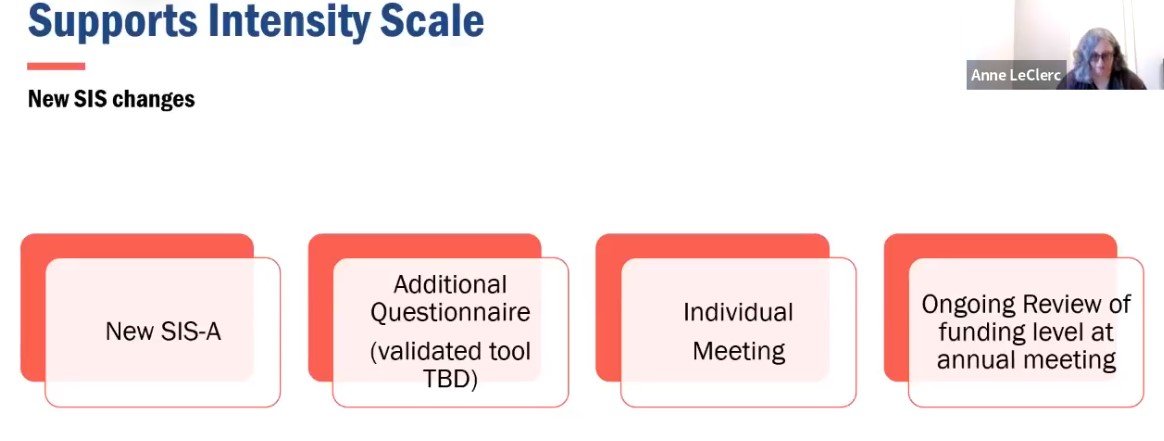Medicaid Community Services Win Big in RI State Budget
/Rep. Marvin Abney, D-Newport, House Finance Committee Chairman, Introduces Budget Bill on House Floor - RI CAPITOL TV IMAGE
By Gina Macris
(This article has been updated.)
The Rhode Island General Assembly has enacted a new state budget of $13.96 billion that emphasizes quality-of-life issues, from education to housing to healthcare. The Senate passed the budget early the morning of June 14 and Governor Dan McKee signed it June 17.
The budget includes an increase of nearly $200 million in federal-state Medicaid reimbursements to stabilize providers of social and human services in the private sector, putting them on a par with their counterparts in neighboring states.
The plan for the fiscal year beginning July 1 marks the largest-ever single year increase to the federal-state Medicaid program. It cleared the House June 7.
Nearly $160 million of the Medicaid increase responds to recommendations of the Office of the Health Insurance Commissioner. According to a spokesman for the House leadership, another $40 million in new Medicaid funding will go to private providers of services used by the state’s child welfare agency, which has been under fire by the U.S. Attorney for a lack of community services. More than half the total cost of the Medicaid increases is funded by the federal government.
The fiscal package represents a bipartisan effort that is “about people,” said House Finance Committee Chairman Marvin Abney when introducing the fiscal package on the House Floor June 7. The budget passed the House 69-5 and cleared the Senate Finance Committee unanimously.
“This is a budget that reaffirms our commitment to education, taking care of kids, (and) those who need us most,” Abney said. The budget helps “all Rhode Islanders improve their lives,” he said.
“We continue to face a housing shortage and pressure from inflation. These are not easy fixes, and the budget doesn’t pretend they are, but it does make historic investments,” Abney said. “The collaboration of fellow legislators, advocates, and our friends in the executive branch cannot be overstated,” he said.
One way or another, Medicaid impacts the lives of 320,000 Rhode islanders, said Senate Finance Committee Chairman Louis DiPalma, D-Middletown, as he introduced the budget to the Senate Finance Committee June 11.
The shift to a “people’s budget” has been fueled by more than a decade of advocacy, most prominently involving some 4,000 adults with developmental disabilities, who were hit with drastic Medicaid cuts in 2011 which advocates say led to a civil rights consent decree in 2014.
Despite the consent decree, it took a federal court order in 2021 to move the needle on Medicaid funding – but only for providers of developmental disabilities services. Other community human services, affecting children, those suffering from addiction, the elderly, and others, continued to stagnate, with waiting lists growing, particularly for infants and toddlers needing early intervention.
In 2022, providers of nearly every Medicaid-funded service in the state descended on the State House for an hours-long hearing before the Senate Finance Committee, telling legislators that the lack of Medicaid funding threatened to destabilize the state’s entire health care and social service system. Related article here.)
That year, the General Assembly passed legislation requiring the Office of the Health Insurance Commissioner (OHIC) to conduct a comprehensive review of fair market rates for all private community-based human and social services every two years. The first report, completed in September, 2023, called for about $160 million in new Medicaid funding, not including developmental disabilities, which had just adopted a new rate structure after a court-ordered rate review.
In January, Governor Dan McKee proposed slowing down the implementation, as well as future OHIC rate reviews, but the General Assembly has turned that approach aside. DiPalma, the architect of the 2022 law calling for biennial Medicaid rate reviews, said that fully funding the Health Insurance Commissioner’s recommendations was a “critical” issue.
Weeks before the House vote, the U.S. Attorney announced new civil rights allegations linked to a lack of Medicaid-funded community services, raising the possibility of a lawsuit or a new consent decree governing the state’s child welfare system – in addition to the separate, ongoing judicial oversight of developmental disabilities services, which has cost Rhode Island hundreds of millions of dollars over the last few years. The state’s Department of Children, Youth and Families (DCYF) is talking with federal officials about a settlement in the latest child welfare case.
In the meantime, the budget will add $21.9 million to DCYF to expand home-based programs, $5.4 million for adoption and foster care, more than $ 2 million for congregate care of children, $1.5 million for a rate-setting consultant, and other expenses totaling nearly $40 million in Medicaid funding, according to House Finance Committee notes.
The new civil rights allegations, announced by U.S. Attorney Zachary Cunha May 13, say 527 children have been hospitalized for months or even years unnecessarily for psychiatric conditions that should be treated long-term at home or in more home-like settings.
The legal framework for the 2014 consent decree affecting adults with developmental disabilities and the latest complaint is the same: the Integration Mandate of the Americans With Disabilities Act. It says people with disabilities must have access to public services in the least restrictive environment that is therapeutically appropriate. The 1999 Olmstead decision by the U.S. Supreme Court re-affirmed that mandate, saying the least restrictive environment is presumed to be the community.
In the case of the 2014 consent decree, federal oversight of the developmental disabilities system will continue until 2026.
Over the past year, the state has begun implementing a new rate model and administrative structure intended to help adults with developmental disabilities get jobs and participate in more community activities. A court-appointed monitor says that “much has changed,” but that the state must intensify its efforts if it is to achieve full compliance with the consent decree in the next two years.
Not all the new services promised by the state are actually available, and those that exist, like add-on employment services, are difficult to obtain, according to the monitor, A. Anthony Antosh.
The result: the Division of Developmental Disabilities is leaving money on the table. The House Finance Committee cut more than $38 million from the Governor’s original budget request for developmental disabilities in the next fiscal year, on the recommendation of the May Caseload Estimating Conference.
The governor had asked for nearly $462.4 million for privately-run developmental disabilities in Fiscal 2025, but the Caseload Estimating Conference recommended about $423.9 million.
Similarly, the budget cuts $39.6 million from the governor’s request of $442.8 million for privately-run services to close out the current fiscal year June 30. The Caseload Estimating Conference recommended $403.2 million.
(The recommendations do not include a separate state-run group home system for adults with developmental disabilities – not affected by the consent decree - which is funded at roughly $32.5 million a year.)
The Caseload Estimating Conference makes projections for developmental disabilities - and other Medicaid categories - based on current costs. But the court monitor, Antosh, says the numbers reflect problems with the implementation of the consent decree.
For example, agencies have been paying for professional services, like nursing, but haven’t been able to get reimbursements from the state because a new billing system cannot yet handle their submissions, he said in a report to the court. The agencies must be allowed to bill retroactively to capture those reimbursements, he said.
In a recent report, Antosh said a new process for building individual budgets based on a thoughtful, personalized three-step assessment process has not yet come together. The state also lacks the independent facilitators who are supposed to help eligible persons get the services they need, Antosh said.
The budget plan includes $1.9 million in the Executive Office of Health and Human Services for 18 state social workers to act as independent facilitators during the next fiscal year, while a statewide approach to conflict-free case management is developed for all Medicaid recipients of home and community-based services.
Antosh in recent months has submitted detailed reports to Chief Judge John J. McConnell, Jr. of the U.S. District Court, who will hear the case Thursday, June 13, at 11 a.m.
The public can access the remote hearing by following the instructions on the calendar page of the court here.






















